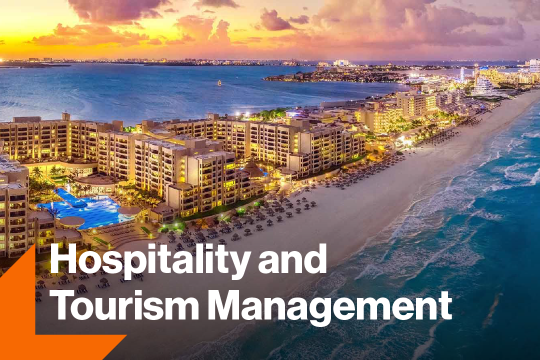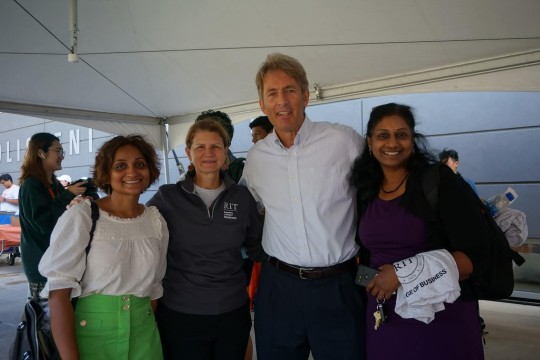Hospitality Management Minor
- RIT /
- Rochester Institute of Technology /
- Academics /
- Hospitality Management Minor
Overview for Hospitality Management Minor
Hospitality industries and related entrepreneurial businesses include those in lodging, resorts, food, entertainment, events and conventions, and tourism. The hospitality management minor provides an opportunity to learn about service–oriented businesses that are a significant portion of the economies of many countries.
Notes about this minor:
- This minor is closed to students majoring in hospitality and tourism management.
- Posting of the minor on the student's academic transcript requires a minimum GPA of 2.0 in the minor.
- Notations may appear in the curriculum chart below outlining pre-requisites, co-requisites, and other curriculum requirements (see footnotes).
- At least nine semester credit hours of the minor must consist of specific courses not required by the student’s degree program.
The plan code for Hospitality Management Minor is HSPMGT-MN.
Featured Work and Profiles
-
Research Insights: Uncivil Wars
Edwin Torres Areizaga Incivility in the virtual workspace
Read More about Research Insights: Uncivil Wars -
Research Insights: Food tourism, a life satisfaction factor
Muhammet Kesgin Food tourism contributes to long-term life satisfaction and sense of well-being
Read More about Research Insights: Food tourism, a life satisfaction factor -
Research Insights: Hotels a Lifeline in Hurricanes
Rick Lagiewski, Victor Perotti How do customers view service in a disaster?
Read More about Research Insights: Hotels a Lifeline in Hurricanes
Curriculum for 2024-2025 for Hospitality Management Minor
Current Students: See Curriculum Requirements
| Course | ||
|---|---|---|
| Required Courses | ||
| HSPT-225 | Hospitality and Tourism Management Fundamentals |
|
Hospitality and tourism industry is one of the largest industries in the world. This introductory course provides students with an overview of hospitality industry and segments of travel and tourism. Students are introduced to career opportunities and skills needed to succeed in the specific hospitality and tourism fields. Students examine the growth and development of industry segments and their distinguishing characteristics, current issues and trends. Students will learn about the interdependence of the various industry players and the roles of these diverse participants within the industry. The concepts and practices of hospitality management are examined and discussed. Lecture 3 (Fall). | ||
| HSPT-315 | Lodging Operations Analytics and Management |
|
This class includes an overview of hotel management from its opening to continuing operations. It focuses on the integrated functions of the front office, housekeeping, engineering, security, food & beverage, human resources, and accounting, as well as considering their roles individually. Students will apply revenue management principles (e.g., capacity management, duration control, demand and revenue forecasting), costing (e.g., budgeting, marginal costing, standard costing and variance analysis, labor accounting, balanced scorecard) and interpret hospitality financial statements (uniform system of accounts for lodging and restaurants) to understand and manage organizational performance. The course addresses foundational metrics and definitions used by the hotel industry and provides an opportunity to complete a certification exam (CHIA: Certification in Hotel Industry Analytics) by STR through the American Hotel and Lodging Educational Institute. Lecture 3 (Spring). | ||
| HSPT-335 | Food and Beverage Management |
|
This course will provide the student with the knowledge needed for the effective management of food service operations. Students will identify trends in the food and beverage industry, learn food and beverage management principles and understand how providing exceptional guest service can maximize profits in the hospitality industry. Topics will include food and beverage purchasing, inventory, costing, service styles, financial controls, menu design, sanitation, safety, ethics, food service automation, hardware and software, legal concerns, equipment selection, and service innovations in the design and layout of food establishments. Lecture 3 (Spring). | ||
| Electives | ||
| Choose two of the following: | ||
| DECS-310 | Operations Management |
|
A survey of operations and supply chain management that relates to both service- and goods- producing organizations. Topics include operations and supply chain strategies; ethical behavior; forecasting; product and service design, including innovation and sustainability; capacity and inventory management; lean operations; managing projects; quality assurance; global supply chains; and the impacts of technology. (Prerequisites: STAT-145 or MATH-251 or equivalent courses.) Lecture 3 (Fall, Spring, Summer). | ||
| HSPT-215 | Principles of Food Production and Service |
|
Principles of Food Production and Service is a basic course covering food preparation methods, quality standards, food presentation, professionalism in food preparation and service, sanitation and safety processes in commercial kitchens, kitchen and restaurant organization and roles, and food service styles. Students completing this course should be able to function effectively in a kitchen or restaurant environment; including demonstrating professional appearance and behaviors; and knowledge of food preparation techniques, effective food presentation, food safety and sanitation practices, appropriate service styles, teamwork, and cleanup practices. Students are expected to achieve their required co-curricular requirement – the ServSafe Manager certification – by the end of this course. Lec/Lab 6 (Fall). | ||
| HSPT-232 | Hospitality Real Estate Development |
|
Students will learn the criteria that owners and investors follow in developing hotel concepts and locating them in key markets where they will succeed. Students will also learn the steps in site selection, working with the trades in the design and construction phase, and turning the operation over to management. This course will provide the knowledge necessary to make key decisions regarding new construction, renovation, restoration, lease or ownership as well as the acquisition, repurposing, and disposition of assets. Students will also learn about the maintenance and upkeep of hospitality real estate. Lecture 3 (Fall). | ||
| HSPT-336 | Risk Management and HTM Law |
|
The course examines the principles, tools, techniques, and methods employed in order to be effective in reducing the risk of liability in the hospitality setting. Students learn how to recognize, evaluate and control, and treat some of the risks associated with operating hospitality businesses. Students study hospitality based negligence cases, court decisions, and resulting judgments. Safety and disaster management issues will be addressed. (A minimum of 3rd year standing is required to enroll.) Lecture 3 (Fall). | ||
| HSPT-350 | Event & Project Management |
|
The meeting and event planner of today must know how to plan, execute, and evaluate any event to show value to the stakeholders. Meetings today help us celebrate meaningful events, change the way people behave, motivate employees to perform better, and solve problems by bringing together ideas from many different cultures. This course is designed to provide an introduction to the principles and concepts required for the management and execution of a successful event. Essential topics will include event planning, coordination, sponsorship, budgeting, programming, marketing, communications, vender management, volunteer management, risk management, event research, and event evaluation. (A minimum of 3rd year standing is required to enroll.) Lecture 3 (Spring). | ||
| HSPT-375 | Customer Experience Management |
|
The overall objectives of this course are twofold. This course first examines the development, management, and improvement of service delivery systems used by service organizations (i.e., hotels, restaurants, travel agencies, and health care) on the supply side through the lens of quality management. Secondly, the course examines customer requirements on the demand side by focusing upon how customer experience design shapes customers’ thoughts, actions, and decision processes. Students will learn techniques used for diagnosis, measurement, and continuous improvement of successful customer experience. There are three major sections in this course. Section 1 focuses on understanding the paradigm of customer experience, identifying the drivers of customer satisfaction, formulating strategies to optimize the customer experience, and managing service operations through the development of a service blueprint. Section 2 focuses on the role of exponential technologies, such as artificial intelligence, robotics, augmented reality, virtual reality, and data analytics, in creating exceptional customer experiences. Section 3 discusses the creation of exceptional luxury customer experiences, incorporating technology, and describing how brands go beyond traditional branding frameworks to create luxury experiences. Lecture 3 (Fall). | ||
| HSPT-485 | Restaurant and Event Management |
|
Students guided by the instructor will manage Henry’s, a restaurant operating during the semester and open to the public. Management skills emphasized will include menu development, costing, forecasting, marketing, food production, customer service, and plate presentation. Students will use these skills to deliver quality service maintaining food safety and cost standards. Students will also learn how to execute discrete events. (Prerequisites: HSPT-335 and HSPT-375 or equivalent courses.) Lec/Lab 12 (Fall). | ||
| HSPT-495 | Hospitality Project Planning and Development |
|
This course requires students to synthesize and build upon knowledge acquired in prior courses, engaging in a hospitality / tourism project. Students will draw upon existing available information, add to it their own research efforts, and consider various options before arriving at conclusions or solutions. Topics related to the strategic analysis of hospitality enterprises will be discussed. (Prerequisites: HSPT-315 and HSPT-335 or equivalent course and 4th year standing.) Lecture 3 (Spring). | ||
| INTB-225 | Global Business Environment |
|
Being an informed global citizen requires an understanding of the global business environment. Organizations critical to the development of the global business environment include for-profit businesses, non-profits, governmental, non-governmental, and supranational agencies. This course introduces students to the interdependent relationships between organizations and the global business environment. A holistic approach is used to examine the diverse economic, political, legal, cultural, and financial systems that influence both organizations and the global business environment. (This course is available to RIT degree-seeking undergraduate students.) Lecture 3 (Fall, Spring). | ||
| MGMT-215 | Organizational Behavior |
|
As an introductory course in managing and leading organizations, this course provides an overview of human behavior in organizations at the individual, group, and organizational level with an emphasis on enhancing organizational effectiveness. Topics include: individual differences, work teams, motivation, communication, leadership, conflict resolution, organizational culture, and organizational change. (This class is restricted to undergraduate students with at least 2nd year standing.) Lecture 3 (Fall, Spring, Summer). | ||
| MGMT-340 | Business Ethics and Corporate Social Responsibility |
|
This course applies concepts of ethics to business at the macro level and at the micro level. At the macro level the course examines competing business ideologies exploring the ethical concerns of capitalism as well as the role of business in society. At the micro level the course examines the role of the manager in establishing an ethical climate with an emphasis on the development of ethical leadership in business organizations. The following topics are typically discussed: the stakeholder theory of the firm, corporate governance, marketing and advertising ethics, the rights and responsibilities of employees, product safety, ethical reasoning, business's responsibility to the environment, moving from a culture of compliance to a culture of integrity, and ethical leadership. (This class is restricted to undergraduate students with at least 2nd year standing.) Lecture 3 (Fall, Spring). | ||
| MKTG-230 | Principles of Marketing |
|
An introduction to the field of marketing, stressing its role in the organization and society. Emphasis is on determining customer needs and wants and how the marketer can satisfy those needs through the controllable marketing variables of product, price, promotion and distribution. (This class is restricted to undergraduate students with at least 2nd year standing.) Lecture 3 (Fall, Spring, Summer). | ||
Related News
-
August 6, 2024

Hospitality and Tourism Management, a Gateway to Careers Delivering World-Class Experiences
The hospitality and tourism management undergraduate degree from Saunders College of Business prepares innovative professionals with a deep understanding of hospitality, business, technology, and service to deliver world-class experiences.
-
August 6, 2024

Business Exploration Provides Business Exposure to First-Year Students
The business exploration program at Saunders College of Business is your opportunity to spend up to a year and a half taking fundamental business courses and meeting with faculty, staff, and career advisors before selecting from one of the college’s seven, nationally-ranked, business majors.
-
June 3, 2024

2023-24 Saunders Faculty and Staff Go Above and Beyond
Saunders College of Business recognizes the accomplishments of its outstanding employees throughout the 2023-24 academic year.
Contact
- Matthew Cornwell
- Associate Director of Student Services
- Student Services
- Saunders College of Business
- 585‑475‑6916
- mcornwell@saunders.rit.edu
Saunders College of Business











